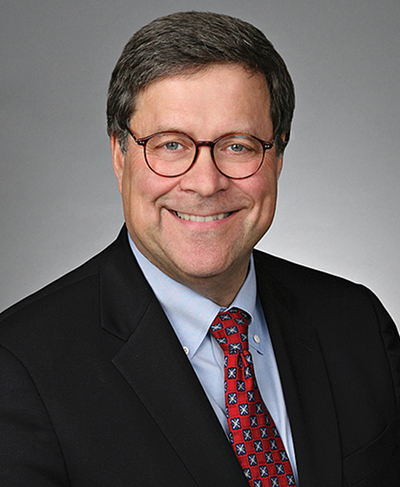Attorney general nominee Barr says he will let special counsel Mueller finish probe

William Barr. Photo courtesy of Kirkland & Ellis.
Attorney General nominee William Barr said in written testimony released on Monday that he won’t allow partisan politics or other considerations to interfere with the work of special counsel Robert Mueller, a friend as well as a professional acquaintance.
“On my watch,” Barr said, “Bob will be allowed to complete his work.” Barr is scheduled to testify before the Senate Judiciary Committee for his confirmation hearing on Tuesday. The Washington Post, the New York Times, USA Today and BuzzFeed News have coverage of his written remarks.
Barr said President Donald Trump “sought no assurances, promises or commitments from me of any kind, either express or implied, and I have not given him any, other than that I would run the department with professionalism and integrity.”
If confirmed, Barr said, “I will not permit partisan politics, personal interests or any other improper consideration to interfere with this or any other investigation.”
Barr also said he thinks it is “very important” that the public and Congress be informed of Mueller’s work. “For that reason,” he said, “my goal will be to provide as much transparency as I can consistent with the law.”
Barr, 68, is of counsel at Kirkland & Ellis. He was formerly attorney general in the George H.W. Bush administration. Barr said he was initially reluctant to return to that role because he is partially retired and nearing the end of a long career.
“But, ultimately, I agreed to serve,” he said, “because I believe strongly in public service, I revere the law, and I love the Department of Justice and the dedicated professionals who serve there. I believe I can do a good job leading the department in these times.”
Barr also addressed a memo he wrote to the DOJ last year that said Mueller was apparently pursuing an obstruction theory based on a “legally insupportable reading of the law.”
Barr said in the memo that Mueller was apparently investigating Trump for telling former FBI Director James Comey he hoped he could let go of the investigation of Michael Flynn and for later firing Comey. But the president has the authority under the Constitution to remove an official, to use his prosecutorial discretion to give direction on a case, or to use his pardon power, Barr wrote.
In his written testimony to Congress, Barr said the memo “was narrow in scope, explaining my thinking on a specific obstruction-of-justice theory under a single statute that I thought, based on media reports, the special counsel might be considering.
“The memo did not address—or in any way question—the special counsel’s core investigation into Russian interference in the 2016 election. Nor did it address other potential obstruction-of-justice theories or argue, as some have erroneously suggested, that a president can never obstruct justice.”
Addressing his priorities, Barr said he wanted to continue the DOJ’s progress on violent crime, although he would “diligently implement” the new criminal justice reform bill, the First Step Act. As part of his focus on crime, Barr said, he will prosecute political violence and attacks motivated by people’s differences.
He also pledged to continue to prioritize immigration enforcement. “As we open our front door, and try to admit people in an orderly way, we cannot allow others to flout our legal system by crashing in through the back door,” he wrote.
A third priority, he said, is protecting the integrity of elections. That includes ensuring that “the full might of our resources are brought to bear against foreign persons who unlawfully interfere in our elections,” he wrote.



